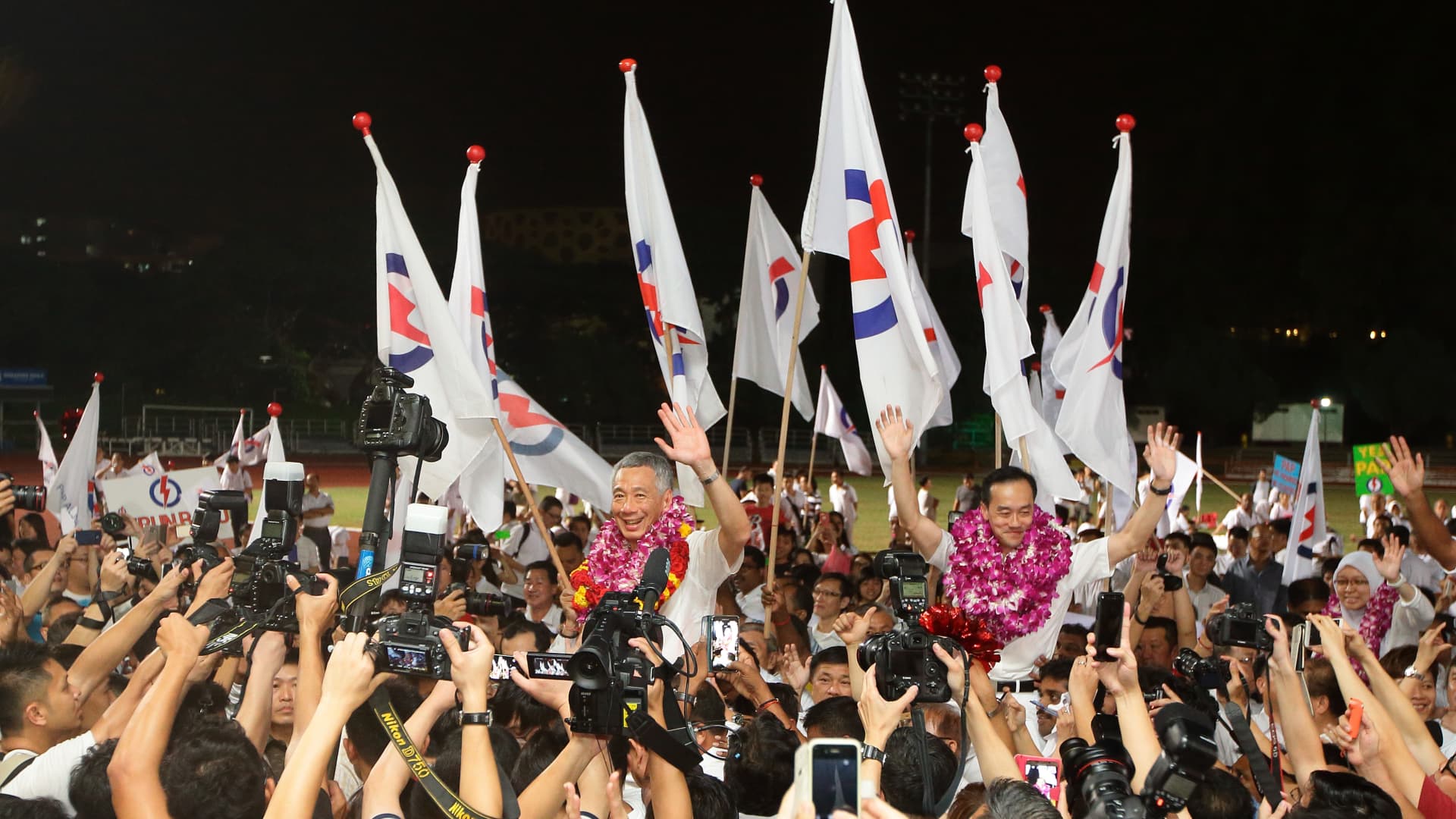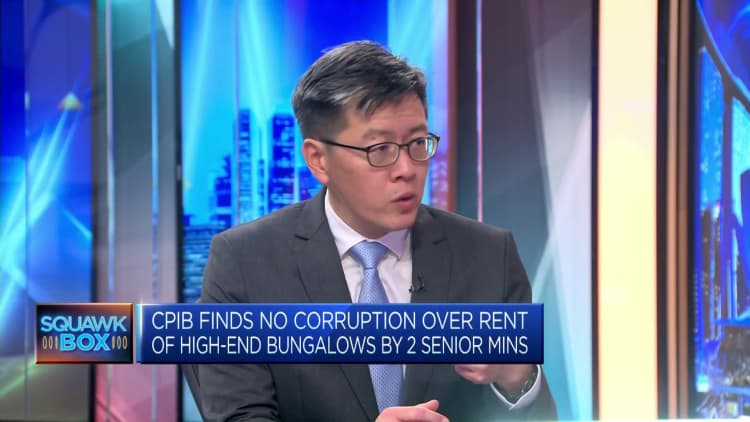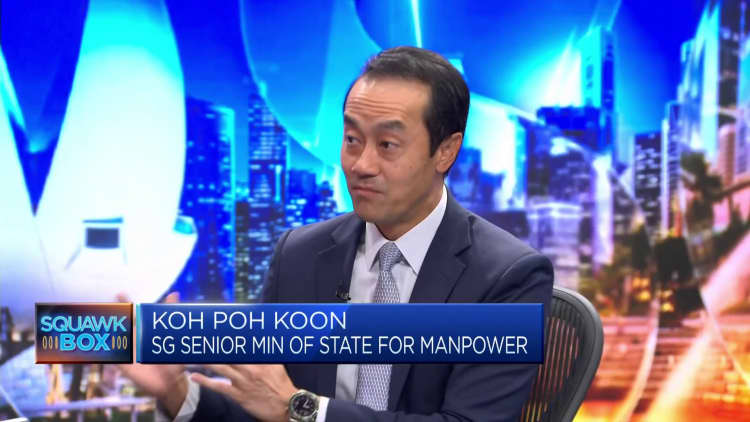
SINGAPORE – SEPTEMBER 11: Prime Minister and People’s Action Party (PAP) Secretary General, Lee Hsien Loong (L) and Dr Koh Poh Koon (R) celebrate after winning their seat for Ang Mo Kio Group Representation Constituency (GRC) on September 11, 2015 in Singapore.
Suhaimi Abdullah | Getty Images News | Getty Images
SINGAPORE — Political scandals are rare in Singapore. The city-state has long touted its clean government and incorruptible image to bolster its standing as a leading financial hub in Asia to attract foreign investors.
But the Southeast Asian nation is now caught up in a series of high profile incidents that has entangled its political elite.
This is the “most severe crisis” facing Singapore as the latest events “have and could further erode the public’s trust and confidence” in the government, Eugene Tan, an associate professor of law at Singapore Management University, told CNBC.
“The ruling party is now looking vulnerable as it never did in recent memory,” he added. “It now has a mountain to climb. How it recovers will matter immensely.”
These are severe reputational hits to the PAP government that had long prided itself for governing with honesty, integrity, and probity.
Eugene Tan
associate professor of law, Singapore Management University
In the latest blow, the political crisis deepened after the sudden resignations of two lawmakers, including the Speaker of Parliament, over an affair this week. Both were members of the ruling People’s Action Party, that has governed Singapore since 1959.
The revelation came just days after authorities said cabinet minister S. Iswaran and a business leader in Singapore were involved in a high-profile corruption probe by the anti-graft agency.
“These are severe reputational hits to the PAP government that had long prided itself for governing with honesty, integrity, and probity. In turn, Singapore’s reputation and standing is impacted too,” said SMU’sTan.
The spate of events “coming in rapid succession does make a dent on the image of the ruling party,” further noted Tan Ern Ser, associate professor of sociology at the National University of Singapore.
This is especially true, given that “being squeaky clean is one of the key pillars of the PAP brand,” he added.

On Monday, Singapore’s Prime Minister Lee Hsien Loong said he decided the incumbent speaker of the Singapore’s Parliament Tan Chuan Jin “had to go.”
The decision came after he received information that Tan and another PAP lawmaker Cheng Li Hui had continued in their “inappropriate relationship” even after the prime minister advised them to end their relationship in February.
In Singapore, politicians are held to a much higher standard since the ruling party’s “whole basis of its political legitimacy” has been built on “clean and incorrupt governance,” SMU’s Tan told CNBC’s “Squawk Box Asia.”
What the government does now is critical, he added.
“It has to go beyond damage control to renewing or even purging the system of its inadequacies, blind spots, and frailties,” said Tan. “This is the surest way to avoid withering trust and confidence.”
The prime minister’s office did not respond to CNBC’s request for comment.
‘Moral high ground’
Last week, Singapore’s transport minister S. Iswaran and prominent hotel tycoon Ong Beng Seng, were arrested before being released on bail, in the country’s most serious corruption probe in nearly four decades.
Both men are currently assisting with the investigation, Singapore’s Corrupt Practices Investigation Bureau revealed.
Singapore’s government officials are among the world’s highest paid, as the country seeks to discourage corruption and attract the best talent. Ministers are paid about 1.1 million Singapore dollars ($822,000) a year, according to the Public Service Division’s website.
The political “drama” that has unfolded comes as “a real surprise, a shock perhaps,” to Singaporeans, said Felix Tan, associate lecturer at Nanyang Technological University in Singapore.
High standards of propriety and personal conduct, together with staying clean and incorrupt, are the fundamental reasons Singaporeans trust and respect the PAP.
Lee Hsien Loong
Singapore prime minister
Singaporeans, who are not used to political scandals, have taken to memes to express themselves. Social media discussions and commentaries in the local media have also delved into the implications for the country.
While the latest spate of incidents don’t “portray a failure of the system,” it certainly acts as a “test for the government” to re-examine its own high standards, said NTU’s Tan.
When similar scandals happen to the opposition, “the PAP would take the moral high ground and insist that the opposition do the right thing,” the lecturer said.
“And yet, what these cases have shown is that the PAP are doing the exact same things that they urged others not to do,” he said, adding the government has to be “more transparent” in its dealings with the people.
Damage control
The corruption scandal came on the heels of a public scrutiny over two other ministers who rented state-owned bungalows for their personal use. Questions were raised on whether they were paying less than market rates for the properties.
In June, a government review found no evidence of corruption or criminal wrongdoing over the matter.
“I think much depends on how the government addresses these fallouts,” said Tan from NUS. “I believe the state institutions are still strong, and the guardrails would be reinforced in the process of responding to these challenges.”
Singapore Prime Minister Lee Hsien Loong (L) shaking hands with a PAP supporter during a May election rally.
SIMIN WANG | AFP | Getty Images
The prime minister sought to quickly control the damage, emphasizing the government’s zero-tolerance on corruption to allay public concerns.
“High standards of propriety and personal conduct, together with staying clean and incorrupt, are the fundamental reasons Singaporeans trust and respect the PAP, and give us their mandate to form the government,” Lee said Monday.
But he also acknowledged, “No system can be completely infallible.”
“Sometimes things cluster up, but we make sure we put them right, and I hope I put them right and we will be able to set the right tone for a long time to come,” Lee added.
Heavy political cost?
The political fallout comes at a delicate time for Singapore, which is navigating a tricky leadership transition. The prime minister is seeking to hand over power to the next generation of leaders in the near future.
“The longer the delay, it will raise a lot of concerns about whether the next generation leaders are ready,” said SMU’s Tan.
At this week’s briefing, Lee said he has no plans to call an immediate election, despite the vacant seats in Parliament. Singapore will hold its presidential election in the next few months and general elections aren’t due until 2025.
“We are in the second half of the present government’s term, we just opened Parliament recently,” he said. “We have a full agenda for this term, we’re working at it and that’s what we will focus on.”

Tan from NUS said that if elections were held now, “the negative impact on the PAP’s electoral performance would be significant.”
With the government facing pressures from “persistently high inflation,” including rising concerns over home affordability, the ruling party needs to close ranks and “stay on track” in order to achieve “a credible performance,” he added.
While it’s tough to gauge whether the scandals will hurt the ruling party and allow the opposition to make inroads, “there will be a heavy political price to be paid for sure,” noted SMU’s Tan.
“How much is the political cost? We don’t know at this stage,” he added.
“At the very minimal, it could cause the element of doubt. So voters could be more prepared to look at what other parties have to offer.”
Regaining the confidence of people will be tough for the government, he added. “Rebuilding trust is demanding. It will also take time but there isn’t much time to next general election.”
